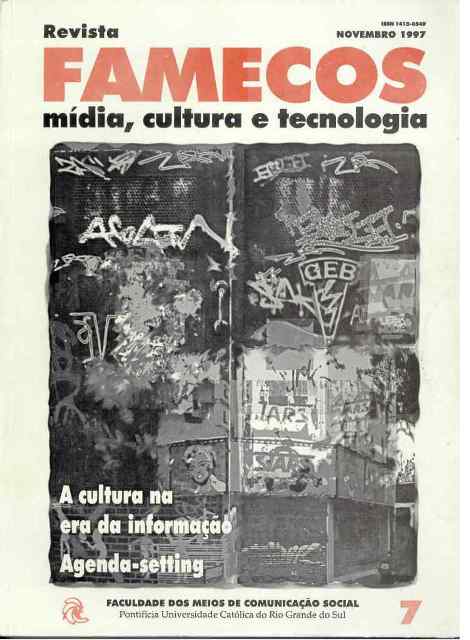The studies on the agenda-setting hypothesis
DOI:
https://doi.org/10.15448/1980-3729.1997.7.2983Keywords:
Communication, communication theories, agenda-settingAbstract
Between the 1920s and 1970s, a number of theories related to communication processes were developed that can be grouped generically in several blocks, as suggested by Mauro Wolf: hypodermic or manipulation theory, empirical field and experimental theories, also called of persuasion, functionalist theory, structuralist theory, critical theory - better known as the Frankfurt School, with all its ramifications - culturological theories, cultural studies, communicative theories (mathematical theory, semiotics in a strict sense, due to Umberto Eco, and linguistics), etc.
Downloads
References
BARROS FILHO, Clóvis. Ética na Comunicação: da informação ao receptor. São Paulo: Moderna, 1995.
DE FLEUR, Melvin L. Teorias de Comunicação de Massa. Rio de Janeiro: Zahar, 1971.
DEBRAY, Régis. Curso de Midiologia geral. Petrópolis: Vozes, 1993;
______. Vida e Morte da Imagem, Petrópolis, Vozes. 1994
LANE, Robert E. et SEARS, David O. A Opinião pública. Rio de Janeiro: Zahar, 1966.
LANG, Gladys Engel et LANG, Kurt. “Watergate: An Exploration of the Agenda-building Process”, in WILHOIT, G.C. & BOCK, H. de (Eds.). Mass Communication Review Yearbook 2. Beverly Hills: Sage, 1981.
LIPPMANN, Walter. Public Opinion. Nova York: MacMillan, 1922.
McCOMBS, Maxwell E. and SHAW, Donald L.” The agendasetting function of mass media”. In Public Opinion Quarterly, Vol. 36, N. 2, Summer 1972.
McCOMBS, Maxwell; EINSIEDEL, Edna et WEAVER, David. Contemporary Public Opinion: Issues and the News. Hillsdale, New Jersey: Lawrence Erlbaum Associates, Publishers, 1991.
NOELLE-NEUMANN, Elisabeth. “Return to the Concept of Powerful Mass Media”, comunicação apresentada no 20th. International Congress of Psychology, em Tóquio. Agosto de 1972. Publicado posteriormente em Studies of Broadcasting, 9 (1973).
RÜDIGER, Francisco. Comunicação e Teoria social moderna. Porto Alegre: Fênix, 1995.
SCHRAMM, Wilbur (Ed.). The Process and Effects of Mass Communication. Urbana: University of Illinois Press, 1954.
SHAW, Donald L. and McCOMBS, Maxwell E. The Emergence of American political issues: The Agenda-setting function of the Press. Saint Paul, Minnesotta: West Publishing Co, 1977.
TARDE, Gabriel. A Opinião e as Massas. São Paulo: Martins Fontes, 1992.
TÖNNIES, Ferdinand. Community and Society. East Lansing: Michigan State University Press, 1957.
WOLF, Mauro. Teorias da Comunicação. Lisboa: Presença, 1992.
__________. Los Efectos sociales de los Media. Barcelona: Paidós, 1994.
Downloads
Published
How to Cite
Issue
Section
License
Copyright
The submission of originals to Revista Famecos implies the transfer by the authors of the right for publication. Authors retain copyright and grant the journal right of first publication. If the authors wish to include the same data into another publication, they must cite Revista Famecos as the site of original publication.
Creative Commons License
Except where otherwise specified, material published in this journal is licensed under a Creative Commons Attribution 4.0 International license, which allows unrestricted use, distribution and reproduction in any medium, provided the original publication is correctly cited.






